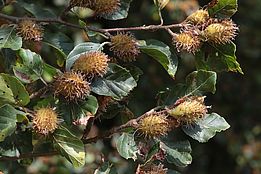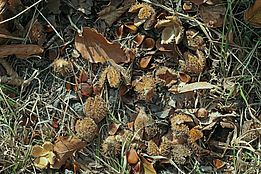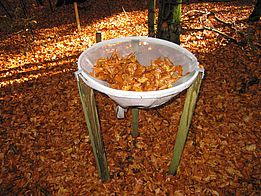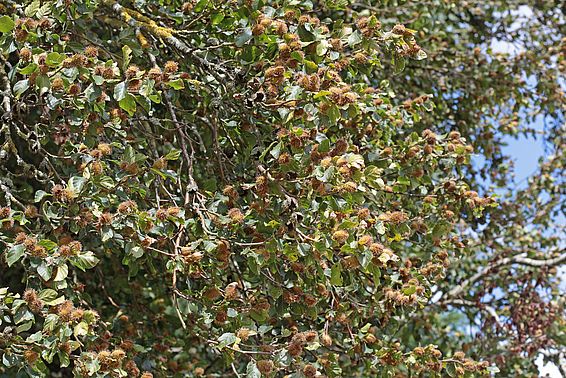26.03.2020 | Beate Kittl | News WSL
Beech trees did not just shed their withered leaves prematurely during the hot, dry summer of 2018, they also dropped their fruit – beech nuts – earlier than usual. Researchers at the Swiss Federal Institute for Forest, Snow and Landscape Research (WSL) describe this response to drought and heat, hitherto undocumented among beech trees, in the journal Scientific Reports.
In 2018, beech nuts should have been especially abundant– in other words, 2018 should have been a ‘mast year’. Pollen concentrations were high in the spring, and beech trees produced a great deal of fruit. Yet in the middle of summer, many trees simply shed their fruit, which was not yet fully developed. Many beech nuts also ended up in the litterfall collectors in the field plots of the Long-Term Forest Ecosystem Research programme (LWF), a WSL programme running at a total of 19 locations in Switzerland. This alerted experts to the fact that the fruit had dropped unexpectedly early.
At three of the LWF sites, which had been under study for 15 to 19 years, researchers began examining climate data and checking whether anything like this had happened since the beginning of observations. At the sites where the beech nuts were dropped early, the summer of 2018 had seen 45% less rainfall than usual plus average summer temperatures that were 1.5°C higher than normal. Fruit production was also aborted early in the summer of 2003, when temperatures reached a record high.



‘Veto’ on fruit development
The researchers conclude that extremely hot, dry summers bring fruit development to an emergency stop, acting as a kind of “environmental veto”, to use the term from their article in Scientific Reports. “Beeches halt fruit development before they have invested too many resources,” explains lead author Anita Nussbaumer of WSL. In lean times, fruit is practically a ‘luxury’ for trees: they need to concentrate their resources on structures that are crucial for their survival, such as leaves, wood and roots. “Fruit is quite far down on their list of priorities,” says Nussbaumer.
The phenomenon of fruit abortion in response to unfavourable environmental conditions or pest infestation had been witnessed in Europe before, but only in cultivated trees, not forest trees. Frost or very wet conditions during pollination can also prevent beeches from fruiting, but this was the first documented case of beeches dropping beech nuts that had already formed. Oak trees are known to shed acorns that are not yet fully developed if there is a late frost.
This premature fruit abscission is further proof that beeches are not very well equipped to cope with the increasingly hot and dry summers that are expected to become more common in Switzerland as a result of climate change. “Such findings are important for forestry services as they need to decide today which tree species they would like to promote in their forests in the next 50 to 100 years,” notes Nussbaumer. Based on these observations, the beech – currently the most common deciduous tree in Switzerland – may not be the preferred option.
Contact
Links
Publications
Copyright
WSL und SLF stellen Bildmaterial zur Bebilderung von Presseartikeln im Zusammenhang mit dieser Medienmitteilung kostenfrei zur Verfügung. Eine Übernahme der Bilder in Bilddatenbanken und ein Verkauf der Bilder durch Dritte sind nicht gestattet.
